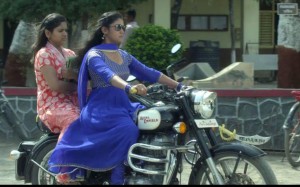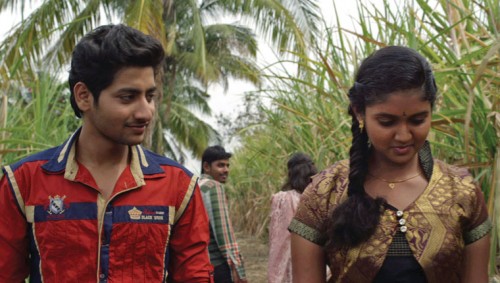Director: Nagraj Popatrao Manjule
First love always has a sound. You remember the music albums from that phase, or the song that played when you first met, or the jingle that you heard before your first phone call, the soundscape of a movie you both watched together, or even something as mundane as the elevator music when you first held hands. These scents and sounds generally get imprinted permanently into minds. It elevates that first time into more than a strong memory, more of a powerful visceral experience. Such primary infatuations activate a dormant part of young brains — a hitherto alien sensation, one that stretches the frame of personal worlds into a labyrinth of crippling emotions.
Cinema, of course, has its own way of putting this across: it relies on its own score, its own manufactured music and noises to convince viewers that this is what innocence, or love, or passion would sound like at that place, at that point in time. Filmmakers can rarely work with smells and touch; the audiovisual medium is their only device to portray multidimensional, complex human conditions.
In Nagraj Manjule’s ‘Sairat’, Ajay-Atul, one of modern Marathi cinema’s foremost musical collaborations, explore the sensory insides of foolish and passionate teen minds. Falling in love is not very different from giving yourself completely — and immersing every pore of one’s being — to an all-consuming symphony, and they understand that. Everything feels big, and epic and orchestral, enough to die, or jump, or leap in slow-motion for, as if the other one is always watching, as if the world depends solely on your ability to court him/her — even though two people are just a tiny, insignificant portion of their vast surroundings.
This background score doesn’t really fit into a lower middle-class environment ripe with casteism and social hierarchy, but then, neither does the notion of love at first sight. 15-year olds often tend to move, and behave, and react in accordance with the prevalent pop culture, and almost always, it’s the most accessible mediums that they emulate: cinema and music. Parshya (Akash Thosar) and Archie (Rinku Rajguru), two naive souls yet to be corrupted by the responsibilities and weaknesses of adulthood, initially feel like they’re part of their favourite love stories. Those stolen glances, secret rendezvouses, ‘planned’ coincidences, fleeting touches and “You eat first — no, you eat” phone conversations feel private and giddy, even though they’re invariably populated by the giggles of nosy friends and suspicious onlookers. Their wooing phase is recognisable and familiar, even though it involves ordinary, unglamorous faces and everyday folks. Usually, mainstream Indian films obsess about physical attraction, and how — more than the two characters finding each other beautiful — the viewers must find them beautiful in order to understand their love. While this is naturally easier on the eyes, more often than not it’s a shallow and empty feeling to watch two ‘inaccessible stars’ narrate their feelings to one another. Far from fulfilling plastic fantasies, their perfect faces make us feel somewhat alienated. Manjule, somehow, makes us fall in love with the idea of falling in love — by showing us a mirror, by playing along and convincing us that there’s hope for even us ordinary humans…until there isn’t.
His two protagonists aren’t the most charming and easy-to-like kids. Parshya is hopelessly gooey-eyed, over-sincere, a dreamer and just a regular college kid. When we first see him, he is already sprinting on one of his many dreamy runs, dangerously close to occupying the ‘Stalker Central’ mind space (a viable attribute in lower India, as Raanjhana once suggested), by shadowing a girl who doesn’t even know he exists. His excitement is fuelled by the notion of how unattainable she is. By now, he has already fallen for her forbidden aura, and has been admiring her for days from behind fields, trees and water pumps. He dreams of her wearing skimpy clothes the way, he would, an Alia Bhatt or Deepika Padukone; she is still an intangible emotion for him. It doesn’t matter when he first spotted her, because this story really isn’t about him.
 We know for sure when Archie spots him — or notices him, at least — for the first time. When he is mid-plunge (a deliberate, sneaky move) — the soaring ‘Yad Lagla’ grasping for orchestral glory — into a tubewell full of water and other girls, their eyes meet. When he walks back up the stairs past her, she senses his gaze. He makes sure she does. It’s unmistakably male, and yet it isn’t. On his soft face, it looks complimentary. It isn’t something she’s used to, yet.
We know for sure when Archie spots him — or notices him, at least — for the first time. When he is mid-plunge (a deliberate, sneaky move) — the soaring ‘Yad Lagla’ grasping for orchestral glory — into a tubewell full of water and other girls, their eyes meet. When he walks back up the stairs past her, she senses his gaze. He makes sure she does. It’s unmistakably male, and yet it isn’t. On his soft face, it looks complimentary. It isn’t something she’s used to, yet.
She is a spoiled brat, the newest entry and most privileged in the new village (which automatically makes her a Devika {Pooja Bedi, in ‘Jo Jeeta Wohi Sikandar’} in terms of college rep), smart-alecky (“…or should I say that in English?” is how she retorts to bullies), an unapologetic show-off (notice the rich colours of her salwars, as opposed to the dullness of her class), and a classic product of an intensely patriarchal atmosphere.
What else explains her affinity for the Royal Enfield (the ultimate alpha-male bike, a traditional symbol of rural bravado), a tractor as her primal statement of heart, Aviator glares, her brazen and confrontational nature (she makes all the first advances, once she realises that he’s different from the breeds in her house; if she had a civilised father and brother, she’d have been craving for bad boys) and a complete inability to execute routine chores? Not quite a tomboy, there’s something agreeable about watching her prance around, like watching a girl forever toying with the idea of becoming a lady. She probably sees and hears the world in different shades and tones than Prashya does. The music that plays in her head when they discover one another is perhaps a little more refined, evident from the way they dance; he is all jumps and shakes, she is a little more coherent. She even has that pouty, patronising, smirky half-smile to mask her own innocence, as if she’s perpetually straining to look more confident than she is, and as if she were constantly looking to impress people even when they’re not around. These are telltale signs of diffident, untested spirits; the first wind of change often brings with it a sweeping expiry of juvenile quirks.
There’s an unmistakable exoticism about their fixation. Their opposite sides of the spectrum only make them more curious about — and possessed, and utterly gripped by — each other. Maybe they’re not that much “in love” as they think, a point that is brutally driven home once they’ve eloped to a big city. That’s how these tremors usually work: they’re thrilling only till it’s a constant chase, a fairytale romance only till society agrees — or, in this case, disagrees and dismisses. It becomes far weightier than just harmless teen devotion when people turn around to look. Being noticed is akin to a director yelling “cut!” in the middle of a perfect sequence. The music, both metaphorically and literally, will stop when others invade this secret universe.
Even while they’re on the run, one can constantly sense that Archie is just a wealthy, privileged, impulsive kid who isn’t getting what she wants. This is her retaliation, a decision borne of hatred over reason, and perhaps a burden she will forever live with.
It does look like a burden when she, well into her humble new life with Parshya in the slums of Hyderabad, reminisces about her family to a colleague. She doesn’t like working for a living, and she emotionally recalls how generous and successful and powerful her father was. The power had cocooned and shaped her being, which, in turn, led her to believe that, as daddy’s little girl, she could perhaps get away with anything.
She suddenly doesn’t need to be at this factory. She doesn’t need to be speaking to a girl she barely knows. Later, she weeps to Parshya about how she wishes for ‘that’ life, its comforts and designs, even though she loves him. Is he really worth it? Are they really worth it? Parshya becomes insecure after this, because he knows she is on the brink. At this point they become just another couple trying to navigate, and adjust, to the realities of life.
 In ‘Moonrise Kingdom’, Wes Anderson’s charismatic take on the timeless anatomy of infatuation, this point is reached when, after putting up a tent and cooking packaged frankfurters, the two eloped kids (lovers and glorious rebels, in their own eyes) begin to dance to a favourite track. They’re in their undergarments, and they’ve always seen adults behave this way, and now they want to explore what the fuss is about. In fact, till now, unlike the other kids in the film, they’ve even spoken and attempted to look like grown-ups (I usually can’t stand kids in movies who “sound” like adults, but Anderson makes sure we know they’re out of depth, because it’s something they’re emulating, like a misguided inside joke.) There is really nothing else they can do after defying the world and proving their point. They’re now at a shabby riverfront, under a gloomy sky, next to a dead fire, hoping to manufacture magic with a first kiss. Not surprisingly, their little experiment ends soon after. If they had been allowed to go on, without looking behind to see if they’re being chased, it wouldn’t have been a pleasant courtship.
In ‘Moonrise Kingdom’, Wes Anderson’s charismatic take on the timeless anatomy of infatuation, this point is reached when, after putting up a tent and cooking packaged frankfurters, the two eloped kids (lovers and glorious rebels, in their own eyes) begin to dance to a favourite track. They’re in their undergarments, and they’ve always seen adults behave this way, and now they want to explore what the fuss is about. In fact, till now, unlike the other kids in the film, they’ve even spoken and attempted to look like grown-ups (I usually can’t stand kids in movies who “sound” like adults, but Anderson makes sure we know they’re out of depth, because it’s something they’re emulating, like a misguided inside joke.) There is really nothing else they can do after defying the world and proving their point. They’re now at a shabby riverfront, under a gloomy sky, next to a dead fire, hoping to manufacture magic with a first kiss. Not surprisingly, their little experiment ends soon after. If they had been allowed to go on, without looking behind to see if they’re being chased, it wouldn’t have been a pleasant courtship.
In ‘Sairat’, Manjule carries on from that moment. He deliberately throws away the rose-tinted glasses (quite literally, in terms of music and images), shows us the unforgiving stench of sewers and claustrophobia, and plants us right between their proverbial coming-of-age phase. There’s the stretch when Parshya looks like he cannot stand her weaknesses and flaws, and seems to have suddenly realised that they are stuck in this together. He can’t handle the fact that she isn’t like him anymore. His anger and frustration may seem a bit staged, but one must remember that he comes from a house where male mood swings and sudden physical violence are earned by the ladies. It is never about if, but when, these outbursts should happen.
Being slapped isn’t really unusual for Archie either; but being slapped by Parshya — who, she thought, had expressed himself like a gentleman thus far — was more than just a smack to the face. In the middle of a restaurant, it feels like a blow to her bravery, her dignity, their decisions, her stubbornness, and most of all, her conscience. And it’s for all to see and scrutinise. For a singer, this phase would be the part where the smooth innocent voice breaks at a certain age, and results in an awkward mutant variation.
She thinks this existence stinks, while, for him, this is in fact a step up, or at least on the way up, from where he expected to be — especially after growing up as a fisherman’s son. Their love isn’t pretty anymore, and the same faces we fell for in the first half now twist and contort into masks of rage and jealousy. Love is soon tempered by an understanding, a most unsexy realisation for any wild heart forced to grow up quickly. She doesn’t want to be snooty, but she can’t help it if that’s how she was brought up. The vast chasm between their being is now more apparent than ever, particularly when they recognise that they’re clinging on to each other because they are partners in crime. Because it’s a habit now, and because there is little other choice, and it’s still better than being alone.
 This sounds like the sobering story of many long-time marriages, much like what the fate of Celine (Julie Delpy) and Jesse (Ethan Hawke) morphs into, in Richard Linklater’s ‘Before Midnight’, the startling conclusion to his impossibly romantic trifecta. After dropping us into the private, wishful worlds of two strangers spending a day together in Europe twice over, away from their worries and real lives, Linklater subverts them into that life they were running away from. Even though they’re vacationing on a rustic Greek island, the whispers of the remnants of their past lives and hangups are louder than ever.
This sounds like the sobering story of many long-time marriages, much like what the fate of Celine (Julie Delpy) and Jesse (Ethan Hawke) morphs into, in Richard Linklater’s ‘Before Midnight’, the startling conclusion to his impossibly romantic trifecta. After dropping us into the private, wishful worlds of two strangers spending a day together in Europe twice over, away from their worries and real lives, Linklater subverts them into that life they were running away from. Even though they’re vacationing on a rustic Greek island, the whispers of the remnants of their past lives and hangups are louder than ever.
With each of these films, we seem to learn this: When you follow your heart, it has consequences — the sorting of which requires you to be practical and cold and mindful, and utilise all those attributes you have abandoned in order to follow your heart.
It can be a viscous cycle, but the pumping of its pedals, at least in case of Indian couples who have dared to be reckless, never stops.
As epic as Archie felt her actions were early on, she didn’t truly envision a future — any future — with Parshya. When the future finally comes, they reluctantly embrace it, explore the edges like lost puppies, find meaning and purpose in their individual lives, work towards a common goal and follow the rules of civilisation. Just when their faded stars begin to align again in a saner fashion, Manjule’s shocking final shot is a horrific reminder of the times we live in. It could be misconstrued as gimmicky, but in context of what we have seen and felt, there is some logic to it. Even if you see it coming — and it doesn’t matter if you do — he has already taken you to a stage where you wish it didn’t happen. Human nature, by design, is optimistic because of the so many complications surrounding us; therefore, if you see happiness, even if it’s momentary, you grasp it and go with it. And you forget that sadness is just around the corner.
The therapeutic montage of ‘settling’ that precedes it is a mild throwback to those heady village days, one that resembles Diane’s (Anne Dorval) wistful dream in Xavier Dolan’s ‘Mommy’, moments before her violent son Steve (Antoine-Olivier Pilon) is forcibly put into a mental institution. In the last shot, Steve is shown escaping the guards in dramatic slow-motion, as he runs towards a high window, the wind in his face, to the evocative first notes of Lana Del Rey’s ‘Born To Die.’
And though Manjule omits all sound from his last scene, while the audience is forced to confront their own noisy thoughts about an honour killing, I couldn’t help but sense Del Rey’s smoky voice fade in, as a wailing baby digests the sight of his dead parents. It’s no coincidence that, for the longest time, Archie and Parshya seem to have misconstrued (like many of us, on first listen) this score to be telling them they were born to fly.
They were, in fact, as soon as they dared to live, born to die.
By RAHUL DESAI (@ReelReptile)







Leave A Comment
You must be logged in to post a comment.